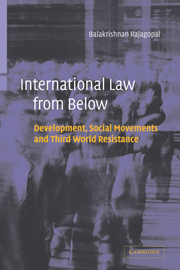Book contents
- Frontmatter
- Contents
- Abbreviations
- Preface and Acknowledgments
- Introduction
- PART I International law, development, and Third World resistance
- PART II International law, Third World resistance, and the institutionalization of development: the invention of the apparatus
- 3 Laying the groundwork: the Mandate system
- 4 Radicalizing institutions and/or institutionalizing radicalism? UNCTAD and the NIEO debate
- 5 From resistance to renewal: Bretton Woods institutions and the emergence of the “new” development agenda
- 6 Completing a full circle: democracy and the discontent of development
- PART III Decolonizing resistance: human rights and the challenge of social movements
- PART IV Epilogue
- References
- Index
6 - Completing a full circle: democracy and the discontent of development
from PART II - International law, Third World resistance, and the institutionalization of development: the invention of the apparatus
Published online by Cambridge University Press: 09 July 2009
- Frontmatter
- Contents
- Abbreviations
- Preface and Acknowledgments
- Introduction
- PART I International law, development, and Third World resistance
- PART II International law, Third World resistance, and the institutionalization of development: the invention of the apparatus
- 3 Laying the groundwork: the Mandate system
- 4 Radicalizing institutions and/or institutionalizing radicalism? UNCTAD and the NIEO debate
- 5 From resistance to renewal: Bretton Woods institutions and the emergence of the “new” development agenda
- 6 Completing a full circle: democracy and the discontent of development
- PART III Decolonizing resistance: human rights and the challenge of social movements
- PART IV Epilogue
- References
- Index
Summary
The post Cold War era has witnessed an unprecedented and far-reaching transformation in the normative corpus and the institutional architecture of international law. This fundamental transformation in international relations could be seen for instance, in the emergence of a new political culture of legitimacy in the form of human rights, a new private law regime in the areas of trade and finance that has tremendous implications for notions of sovereignty and autonomy, new notions of sustainability and resource-use, and a vast network of new international institutions including those that involve civil society actors and even the private sector in addition to states. Indeed, there has been a veritable legalization of international relations. Legal scholars have exhaustively commented upon these developments during the 1990s and tried to offer theoretical frameworks within which a ‘new’ international law could be formulated. This chapter seeks to examine a key theme that has come to dominate the legal and political landscape of the post-Cold-War era: democratization. In particular, I am interested in examining and explaining certain questions such as: What are the social, political, and economic forces that drive democratization and who are the most important actors? What is the relationship between the drive towards democratization and the drive towards marketization in the Third World, which has been the target of massive international interventions since the so-called end of the Cold War? What are the institutional consequences for international law of embracing democratization as an important goal?
- Type
- Chapter
- Information
- International Law from BelowDevelopment, Social Movements and Third World Resistance, pp. 135 - 162Publisher: Cambridge University PressPrint publication year: 2003

